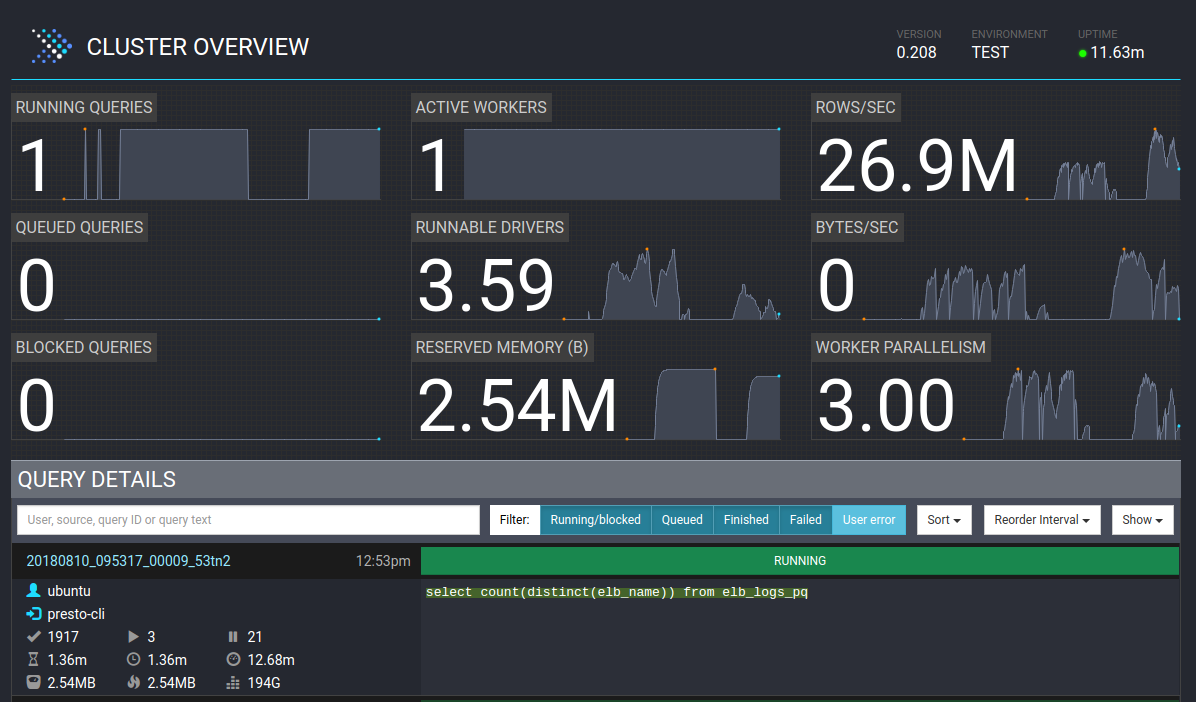Presto is an open source distributed SQL query engine for running interactive analytic queries against data sources of all sizes ranging from gigabytes to petabytes.
Presto was designed and written from the ground up for interactive analytics and approaches the speed of commercial data warehouses while scaling to the size of organizations like Facebook.
This repository allows deploying a Presto cluster on the cloud, using best-practices and state of the art tooling. You need to have the latest versions of Terraform and Packer for all features to work correctly.
Features:
- Fully functional deployment of Presto in a cluster mode (1 coordinator and multiple workers)
- Spot / Preemptible worker instances supported.
- Single coordinator-worker node deployment mode supported for testing and experimentation.
- Auto-healing features baked in.
- Easily manage and add more catalogs (connect Presto to more data-sources).
- AWS deployment support (under
terraform-aws) - Google Cloud Platform deployment (coming soon)
Clone this repo to work locally. You might want to fork it in case you need to apply some additional configurations or commit changes to the variables file.
Create images with Packer (see packer folder in this repo), and then go into the terraform folder and run terraform init. See README files in each respective folder for more detailed instructions.
Once you run terraform apply on any of the terraform folders in this repo, a file terraform.tfstate will be created. This file contains the mapping between your cloud elements to the terraform configuration. Make sure to keep this file safe.
See this guide for a discussion on tfstate management and locking between team members. We highly recommend using dedicated backends for real-world clusters to avoid state loss.
Presto has a nice UI for viewing cluster operations and currently running queries. It can be accessed from http://presto-coordinator-ip:8080/ui/.
In order to run queries, you can connect to Presto via JDBC or SSH into the coordinator node and use the Presto CLI:
presto --catalog hive --schema defaultNote the use of Presto's "catalogs". A Catalog in Presto is a definition of a connection to a data-source. A Catalog can be a schema on a MySQL server, an S3 bucket with partitions and schema that is defined in Hive Metastore, data on Kafka or Cassandra, and many other such options. The use of Catalogs makes it possible to query and join data from multiple data-sources in one Presto query.
By default, we enable the local Hive Metastore catalog, and the JMX catalog. To customize or add your own, see the catalogs folder. Changes to this folder require running packer again.
See here for more Presto concepts.
Presto needs to be carefully fine-tuned for best performance, mainly taking good care of memory allocations, number of cores and parallelisation (number of concurrent queries, splits, etc). This can only be achieved through experimentation, but at the base of this deployment is a good starting point for a typical cluster. We will be adding more guidance and more configuration options soon.
The fastest way to test your installation is to follow AWS Athena's examples in https://aws.amazon.com/blogs/big-data/analyzing-data-in-s3-using-amazon-athena/. If you are running on AWS, this should work out-of-the-box, otherwise you will need to specify your AWS credentials in the hive catalog.
SSH into the Presto coordinator VM and run the Hive REPL ($HIVE_HOME/bin/hive), and within it run the following DDL:
CREATE EXTERNAL TABLE IF NOT EXISTS elb_logs_pq (
request_timestamp string,
elb_name string,
request_ip string,
request_port int,
backend_ip string,
backend_port int,
request_processing_time double,
backend_processing_time double,
client_response_time double,
elb_response_code string,
backend_response_code string,
received_bytes bigint,
sent_bytes bigint,
request_verb string,
url string,
protocol string,
user_agent string,
ssl_cipher string,
ssl_protocol string )
PARTITIONED BY(year int, month int, day int)
STORED AS PARQUET
LOCATION 's3a://athena-examples/elb/parquet/'
tblproperties ("parquet.compress"="SNAPPY");
msck repair table elb_logs_pq;This will create a partitioned "external" Hive table with data on S3. Once done, you can query it via Hive, or you can logout of Hive and query it via the Presto CLI:
SELECT elb_name,
sum(case elb_response_code
WHEN '200' THEN
1
ELSE 0 end) AS uptime, sum(case elb_response_code
WHEN '404' THEN
1
ELSE 0 end) AS downtime
FROM elb_logs_pq
GROUP BY elb_name;ubuntu@ip-172-31-32-64:~$ presto --catalog hive --schema default
presto:default> [paste query copied from above]
elb_name | uptime | downtime
--------------+-----------+----------
elb_demo_004 | 383616619 | 21261503
elb_demo_008 | 383360093 | 21350497
elb_demo_002 | 383632502 | 21300518
elb_demo_009 | 383427076 | 21335844
elb_demo_001 | 383671436 | 21270594
elb_demo_007 | 383490605 | 21303122
elb_demo_005 | 383734702 | 21341740
elb_demo_003 | 383351477 | 21231655
elb_demo_006 | 383506485 | 21336487
(9 rows)
Query 20180810_121913_00002_s3bz8, FINISHED, 3 nodes
Splits: 2,418 total, 2,418 done (100.00%)
0:53 [3.84B rows, 2.51GB] [71.7M rows/s, 48MB/s]